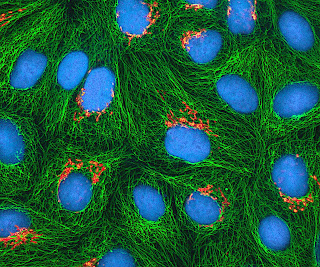Library Showcase: Genetics, Medical Ethics, and more!
 |
| HeLa cells (Pixabay.com) |
This semester we are launching PVCC’s second annual One Book Project! On Club Day (next Tuesday) free copies
of this year’s book, The Immortal Life of Henrietta Lacks by Rebecca Skloot, will be available at the One Book table while supplies last! The book tells the true story of
an African American woman from Virginia who lost her life to cancer in 1951 but
gained immortality through a perpetuating cell line that revolutionized
medical research.
Henrietta’s story explores many topics, including
medical ethics, the study of genetics, cancer, the discrimination of the Jim Crow era, and the persistence of
socio-economic inequalities. You can learn about these issues and more in the
latest library showcase (now in its new location in the Library Teaching Room!)
Here are a few highlights from the display:
The disease that took Henrietta’s life has plagued
humanity for thousands of years. The history of cancer from ancient days to
modern times is traced in this fantastic, Pulitzer Prize-winning book, The Emperor of All Maladies: A Biography of Cancer, by Siddhartha
Mukherjee.
If reading The
Immortal Life of Henrietta Lacks has stirred your interest in science, try The Cell: A Very Short Introduction by Terence Allen & Graham Cowling
or Medical Ethics: A Very Short Introduction
by Tony Hope for a quick information fix on these topics!
Many of Henrietta’s struggles reflect the injustices of
the Jim Crow Era that impacted millions of African Americans. Read more of
their stories in Remembering Jim Crow: African Americans Tell About Life in the Segregated South
edited by William H. Chafe, Raymond Gavins, and Robert Korstad.
Cells are the building blocks of life, but, for most of us,
our cells aren’t a topic to which we give much thought. In The Language of Cells: Life as Seen Under the Microscope, Spencer Nadler describes the enormous impact that these
microscopic parts can have on our human lives.
Joycelyn Elders is very familiar with the discrimination that
has plagued medical care in the United States. The great-granddaughter of
slaves, she attended medical school in Arkansas and went on to become the
Surgeon General of the United States. Her inspirational story is recorded in Joycelyn Elders, M.D. by Jocelyn
Elders and David Chanoff.
The Stuff of Life: A Graphic Guide to Genetics and DNA by Mark Schultz, Zander Cannon, and Kevin Cannon is a
graphic novel that offers a fun and unique way to learn about genetics!
Curious about other revolutionary medical discoveries? The Medical Book: From Witch Doctors to Robot Surgeons, 250 Milestones in the History of Medicine by Clifford
A. Pickover covers the invention of eyeglasses, the first organ transplants,
and other fascinating moments in scientific history—including the discovery of Henrietta's HeLa cells (see page 386).